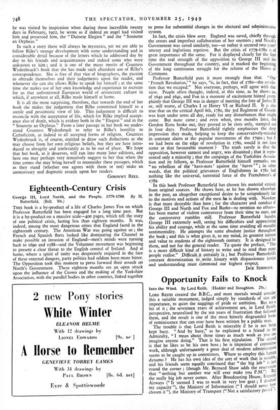Eighteenth-Century Crisis
George III, Lord North, and the People. 1779-1780. By H. Butterfield. (Bell. 30s.)
Tins book is a by-product of a life of Charles James Fox on which Professor Butterfield has been engaged for a long time past. But it is a by-product on a massive scale-400 pages, which tell the story of one political crisis, lasting less than eighteen months. It was, indeed, among the most dangerous crises that England faced in the eighteenth century. The American War was going against us ; the French and Spanish fleets looked like dominating the Channel to make possible an invasion of England—men's minds were turning back to 1690 and 1588—and the Volunteer movement was beginning to present a clear threat to the English control of Ireland. And at home, where a spirit of unity was desperately required in the face of these external dangers, party politics had seldom been more bitter. The Opposition took this moment to press forward their assault on North's Government. These eighteen months see an open attack upon the influence of the Crown and the making of the Yorkshire Association, with the parallel bodies in other counties, linked together
to press for substantial changes in the electoral and administrative system.
In fact, the crisis blew over. England was saved, chiefly through the errors and imperfect collaboration of her enemies ; and North's Government was saved similarly, too—or rather it secured two years' uneasy and inglorious reprieve. But the crisis of 1779-1780 is of great importance all the same. For it displayed clearly for the fuse time the real strength of the opposition to George III and his Government throughout the country, and it marked the beginning of the long continuous struggle for the reform of the House of Commons.
Professor Butterfield puts it more strongly than that. "Our ' French Revolution,'" he says, "is, in fact, that of 1780—the revolu- tion that we escaped." Not everyone, perhaps, will agree with that view. People often thought, indeed, at this time, as he shows us, of 1640 and 1641, and Fox in a moment of excitement hinted pretty plainly that George III was in danger of meeting the fate of James II or, still worse of Charles I or Henry VI or Richard II. It is also true that on the critical April 6th, 1780, the 3rd Regiment of Guards was kept under arms all day, ready for any disturbances that might come. But none came ; and even when, two months later, the Gordon Riots broke out, they proved to be riots only, stamped out in four days. Professor Butterfield rightly emphasises the deep impression they made helping to keep the conservatively-minded in constant alarm at the popular movements of the 1790s; but if we had been on the edge of revolution in 178o, would it not have come at that favourable moment The truth surely is that the opposition, however earnest and angry, was disunited ; that it repre- sented only a minority ; that the campaign of the Yorkshire Associa- tion and its fellows, as Professor Butterfield himself remarks, was " no rebellion of the 'have-nots' against the ' haves '" ; in other words, that the political grievances of Englishmen in 1780 had nothing like the universal, torrential force of the Frenchmen's of 1789.
In this book Professor Butterfield has chosen his material entirely from original sources. He shows here, as he has shown elsewhere in the past, an altogether exceptional desire to be scrupulously fair to the motives and actions of the men he is dealing with. Nowhere is that more desirable than here ; for the -character and conduct of George III and North and Fox and Burke—to mention no others— has been matter of violent controversy from their time to ours, and the controversy rumbles still. Professor Butterfield handles George III extremely well, seeing his difficulties and appreciating his ability and courage, while at the same time avoiding all maudlin sentimentality. He attempts the same absolute justice throughout the book ; and this is what gives it, to my mind, its greatest interest and value to students of the eighteenth century. It is designed for them, and not for the general reader. To quote the preface, "This is a more difficult kind of history to write and to read than many people realise." Difficult it certainly is ; but Professor Butterfield 's constant determination to .,write history with dispassionate justice and understanding must command our highest respect. Jacx SIMMONS.






































 Previous page
Previous page